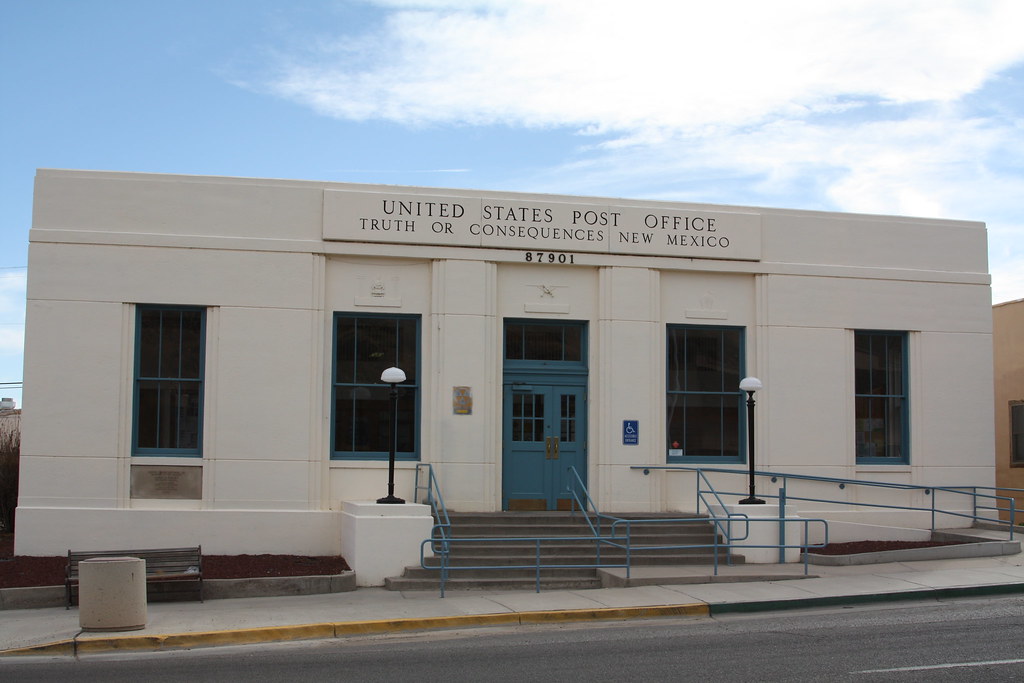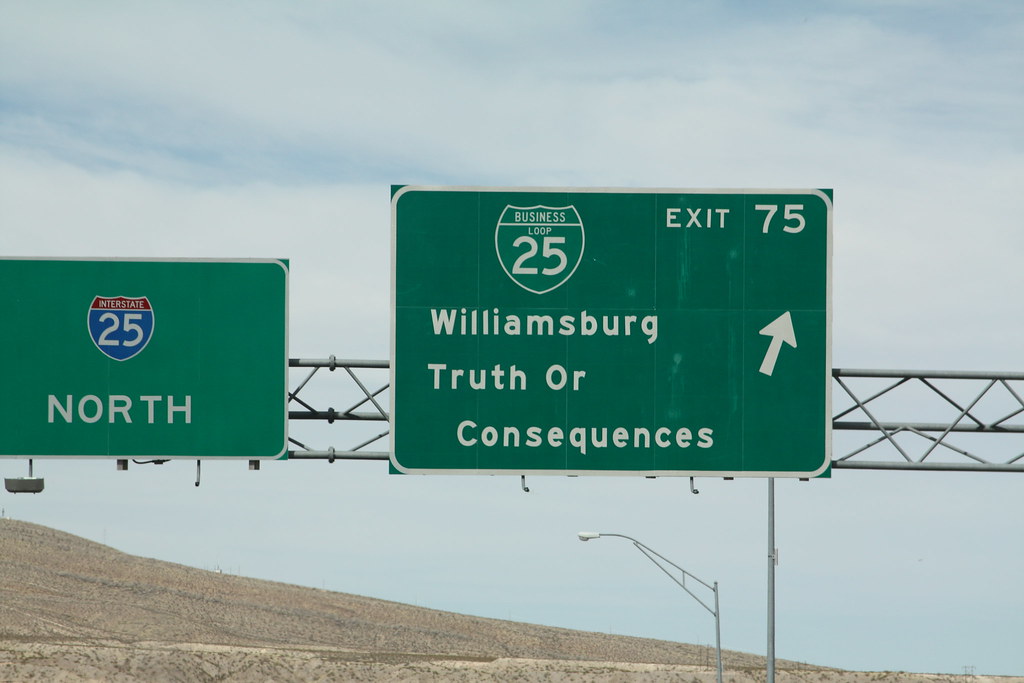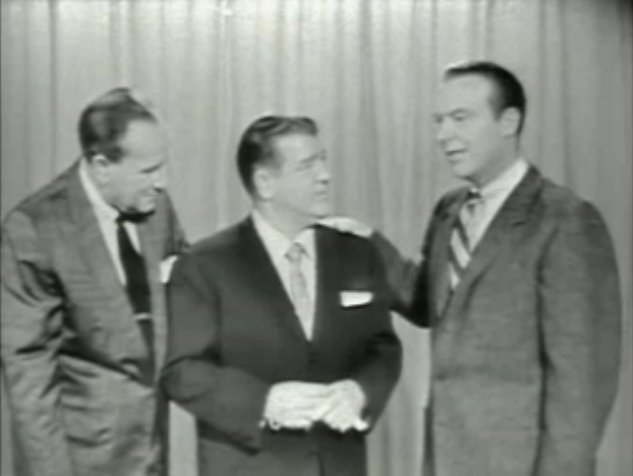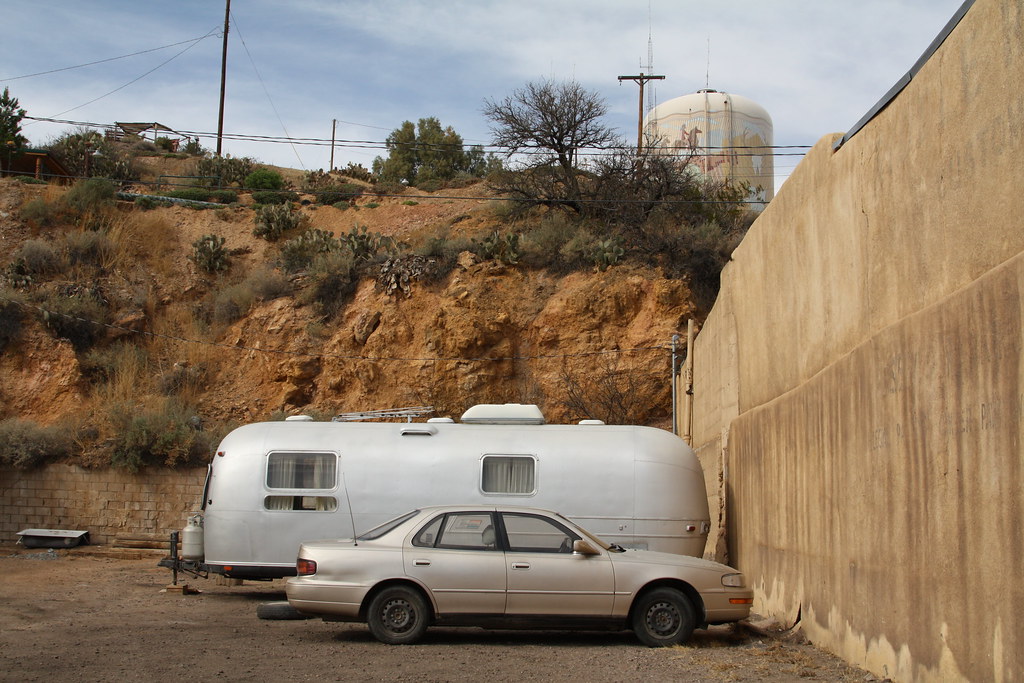.

Street scene, Truth or Consequences, New Mexico: photo by Laura Hertzfeld, 18 March 2009

"Try to ensure that everything in life has consequence." -- This is without doubt one of the most detestable of maxims, one that you would not expect to run across in Goethe. It is the imperative of progress in its most dubious form. It is not the case that consequence leads to what is fruitful in right action, and even less that the consequence is its fruit. On the contrary, bearing fruit is the mark of evil acts. The acts of good people have no "consequence" that could be ascribed (or ascribed exclusively) to them. The fruits of an act are, as is right and proper, internal to it. To enter into the interior of a mode of action, is the way to test its fruitfulness. But how to do this?
Walter Benjamin: from "Try to Ensure that Everything in Life Has a Consequence", fragment written c. 1932, unpublished in the author's lifetime; translated by Rodney Livingstone in Walter Benjamin: Selected Writings: Volume 2 (1927-1934), 1992
Walter Benjamin: from "Try to Ensure that Everything in Life Has a Consequence", fragment written c. 1932, unpublished in the author's lifetime; translated by Rodney Livingstone in Walter Benjamin: Selected Writings: Volume 2 (1927-1934), 1992

Roadside signs, Truth or Consequences, New Mexico: photo by Laura Hertzfeld, 18 March 2009
Older Chinese man, emerging almost invisibly from Saturday evening street crowd, snuck up behind X and, discreetly looking away as he passed as if careful to avoid humiliating the frail dreadlockt mendicant, slipt two rolled up Jacksons into his paper cup, before vanishing back into the busy pedestrian flow.

United States Post Office, Truth or Consequences, New Mexico: photo by Laura Hertzfeld, 18 March 2009
6.422 When an ethical law of the form, 'Thou shalt...' is laid down, one's first thought is, 'And what if I do not do it?' It is clear, however, that ethics has nothing to do with punishment and reward in the usual sense of the terms. So our question about the consequences of an action must be unimportant. -- At least those consequences should not be events. For there must be something right about the question we posed. There must indeed be some kind of ethical reward and ethical punishment, but they must reside in the action itself. (And it is also clear that the reward must be something pleasant and the punishment something unpleasant.)
Ludwig Wittgenstein: from Tractatus Logico-Philosophicus, 1921, translated by D. F. Pears and B. F. MGuinness, 1961

Highway sign on US 25, near Truth or Consequences, New Mexico: photo by Laura Hertzfeld, 18 March 2009

MGR-1B Improved Honest John Surface-to-Surface Missile being launched during testing at White Sands Missile Test Range, 30 miles east of Truth or Consquences, New Mexico: US Army photo via White Sands Missile Range Museum (US ARMY)
Truth or Consequences was a successful and long-running NBC radio show that premiered in March 1940.

Ralph Edwards with Bud Abbott and Lou Costello, 1956: photo by NBC Burbank; screen capture by Oaktree b, 18 March 2009
The show was the brainchild of Ralph Edwards, who said he got the idea from the popular parlour-game Forfeits. The first audience-participation gameshow program of its kind, Truth or Consequences became an instant hit with listeners. Later it morphed into an even more successful network TV show.

The show seemed to strike a deep chord in the secret soul of the American citizen, who, it seemed on this evidence, faced with the option, would prefer not to tell the truth -- even if that decision might bring embarrassing, even personally humiliating consequences.
Cover of Action Comics # 127 (December 1948): art by Al Plastino; image by J Greb, 23 May 2007
Approaching the tenth anniversary of the program, in 1950, Ralph Edwards announced that the gala anniversary show, certain to command the rapt attention of a mass audience across the nation, would be hosted in any town in America that would change its name to Truth or Consequences.

The town of Hot Springs, New Mexico stepped forward.

Ralph Edwards with Bud Abbott and Lou Costello, 1956: photo by NBC Burbank; screen capture by Oaktree b, 18 March 2009
The show was the brainchild of Ralph Edwards, who said he got the idea from the popular parlour-game Forfeits. The first audience-participation gameshow program of its kind, Truth or Consequences became an instant hit with listeners. Later it morphed into an even more successful network TV show.
Bob Barker (right) in his debut as host of TV gameshow Truth or Consequences, 31 December 1956: image by Money game, 24 October 2010
The show seemed to strike a deep chord in the secret soul of the American citizen, who, it seemed on this evidence, faced with the option, would prefer not to tell the truth -- even if that decision might bring embarrassing, even personally humiliating consequences.
Cover of Action Comics # 127 (December 1948): art by Al Plastino; image by J Greb, 23 May 2007
Approaching the tenth anniversary of the program, in 1950, Ralph Edwards announced that the gala anniversary show, certain to command the rapt attention of a mass audience across the nation, would be hosted in any town in America that would change its name to Truth or Consequences.

Airstream trailer with car and water tank, Truth or Consequences, New Mexico: photo by Laura Hertzfeld, 18 March 2009

MGR-1B Improved Honest John Surface-to-Surface Missile being launched during testing at White Sands Missile Test Range, 30 miles east of Truth or Consquences, New Mexico: US Army photo via White Sands Missile Range Museum (US ARMY)
I visited Truth or Consequences shortly after the town changed its name. I recall very little from that visit, but, were I to be telling the truth here, this post would probably be one of its unintended consequences.
This is all a matter of little consequence in any case. The truth is it was wicked hot, some tainted barbecue had entered the picture somewhere along the way and the wee person in the metaphysical compartment of the brain was still cowering back there in the tremulous transit of White Sands, where the road signs in the Test Range Zone had said, Do not stop, do not under any circumstances get out of your car, Be advised that disregarding this warning may have serious consequences.

"The genuineness of an expression cannot be proved; one has to feel it." -- Very well, -- but what does one go on to do with this recognition of genuineness? If someone says, "Voila ce que peut dire un coeur vraiment épris" -- and if he also brings someone else to the same mind, -- what are the further consequences? Or are there none, and does the game end with one person's relishing what another does not?
There are certainly consequences, but of a diffuse kind. Experience, that is varied observation, can inform us of them, and they too are incapable of general formulation; only in scattered cases can one arrive at a correct and fruitful judgment, establish a fruitful connexion. And the most general remarks yield at best what looks like the fragments of a system.
-- Ludwig Wittgenstein: from Philosophical Investigations, Part II, c. 1949, translated by G E. M. Anscombe, 1953

Runway, Northrup Range, Space Harbor at White Sands Missile Range, New Mexico: photo by Sterling Brooks, 1980; image by 4311D, 9 December 2008
X peered disinterestedly into his cup, where the rolled-up bills now rested. What am I supposed to do with these? he shrugged, addressing no one in particular.
Sunset over White Sands National Monument, New Mexico: photo by Franzinho, 22 August 2009




11 comments:
Tom,
"The genuineness of an expression cannot be proved."
(What were those city fathers in Hot Springs thinking?)
6.28
grey whiteness of fog against invisible
ridge, song sparrows calling from field
in foreground, wave sounding in channel
imprisoned in present, past
and future which move
new idea, one realizes only
such, blue impression
sunlight reflected in windblown channel,
cloudless blue sky above fog on horizon
Steve,
imprisoned in present, past
(inundating rains again morn to night, where has that cloudless blue sky gone? was it ever really up there?)
Tom -- This is really wonderful and there will be a lot to come back to. It's very rich, funny and, I think, touching. Thinking about it, I expect "inconsequential" is one of the words I say most often; that and "unimportant". (This happens in situations of advising clients, trying to help Jane put things into perspective and doing the same thing for myself, often talking to myself as I do it.) I used to love Truth or Consequences as a child, but had no idea about the town that changed its name. That is SO peculiar. I'm going to think more about Benjamin's and Wittgenstein's derogation of "consequence" and "consequential". I'm not sure I agree with either of them and think they're overcomplicating (in the service of legitimate inquiry and examination) something that's reasonably simple and well understood. "Inconsequential" wouldn't have its rich meaning and implications without "consequential".
Curtis,
In answering your comment I have found myself locked out of Blogger Dashboard again.
Surely this is a consequence of something, but just as surely it must be an unintended consequence.
Lately I've been growing increasingly bewildered by the idea of causality. It is hard to deny that one thing happens after another thing, but the inference of a logical or causal connection between events often seems to exist principally, or even solely, in the mind of the beholder.
The unintended consequences of human decisions seem too often to cause us to forget the good intentions, if indeed there were any.
Rabbits were introduced into Australia for hunting purposes. In the (extremely limited) view of some, the opportunity to kill harmless animals for sport was regarded as a good.
There were however unintended consequences, as it turned out, and in environmental terms these were extremely negative. The rabbits multiplied, as rabbits have a way of doing. Soon they had created whole gaping stretches of eroded-gully-wasteland.
Perhaps it's the weather that's getting to me.
The Lorenz Attractor model illustrates the process of a dynamic system, which is essentially chaotic and unpredictable. Its original application, of course, was in the field of meteorology.
But that's a field in which no one does not live (until they're dead).
The radical and dramatic shift of weather patterns we've been seeing in the North Pacific are certainly the consequence of something.
The accelerating collapse of the Antarctic ice mass is certainly the consequence of something.
The X factor in the equation seems to be the introduction into the planetary picture of human beings, with all those good (??) intentions implemented by what GE used to call "our most important product" -- progress.
That theory of progress seems to have attained its apogee concurrently with the complex of events and ideas that led to the devil's workshop in the desert where the work of many highly refined minds came to this infernal consequence.
It did occur to me that to locate a tv program whose "hook" was humans' congenial myopia concerning the consequences of their actions, and for the town most proximate to that site of annihilation to re-name itself after the show, may have been appropriate in some way too subtle for anyone to comprehend.
Perhaps the sound of inconsequence occurs at a frequency only dogs can hear.
In that case it might not be entirely unreasonable to put up a Dog for president. No matter how loyal and gentle, no animal can ever be accused of Meaning Well.
Blogger Dashboard seems to be a good place to start. I foresee it all ending there also. It seems to be an unmoved mover (or something like that). Thanks for responding so thoughtfully and in such detail on this subject. The things you write about (which I have an unfortunate tendency to link to the news of the day) have actually kept me up most of the night. (That, and Caroline's coughing; Jane brought some illness home from England that affected her only slightly, and then left for the rest of the summer yesterday, having made her influence felt.) The fact that I actually rose from my slab (actually, it's a really comfortable mattress) at 3:33 am, following this weird pattern I've established), seems significant. Yesterday I finished reading Jules Verne's The Adventures of Captain Hatteras, his second novel and apparently one of Alfred Jarry's favorite books, which features a magnificent and mysterious Great Dane character named Duke, who I would love to see put up for president. Meaning well, while it can be an attractive quality, obviously isn't necessarily a virtue. When we adopted our cats Rose and Pansy from the North Shore Animal League, a very fine "no kill" shelter on Long Island, I read up on the origin of the American Shorthair cat, which is essentially identical to the British Shorthair. (One book, describing the characteristics of this pure-breed, wrote about them: "the cat that looks like a cat.") These cats were apparently brought to North America by the Mayflower party in the role of shipboard mousers. One unintended consequence, I suppose, was centuries of pleasurable human-cat interaction. Pausing on the last 6 lines of Steve's poem gives me pleasure and, dare I say it, hope.
Curtis,
This is crazy. The Blogger cognoscenti are advising me to drop my cookies. I did that last time and it took three weeks to get over. Now I've burrowed into the engine room with a Stone Age browser and a terribly Futuristic Migraine. It's almost enough to drive one to... reason.
At any rate, in order to illustrate this extremely aethereal discussion of ours, that is, to blow it up into a magnum cannonball of confusion...
Of Unintended Consequences
Everyone here with fur is coughing. All they do is eat, cough... one fears for them.
And as for the humans... (Large hood, no coat.)
Computer problems, like the flu, seem to be contagious. I can't open the browser on my own computer. (I'm using Jane's. The summer camp she traveled to yesterday forbids "electronics", which seems like a good idea.) I'm off to the computer store now, trying to be filled with hope, which is difficult when you're running near empty. But it looks like a beautiful day for a trip to the computer store. Curtis
Thanks for putting my T & C photos to good use! Glad you liked them :) - Laura
And thanks to you, Laura. There's nothing like the real thing.
David Parker Ray, November 6, 1939 - May 28, 2002, is said by the FBI to have murdered at least one person per year for forty years, in Truth or Consequences, New Mexico!
My word. That's not a murderer, that's an industry.
Post a Comment